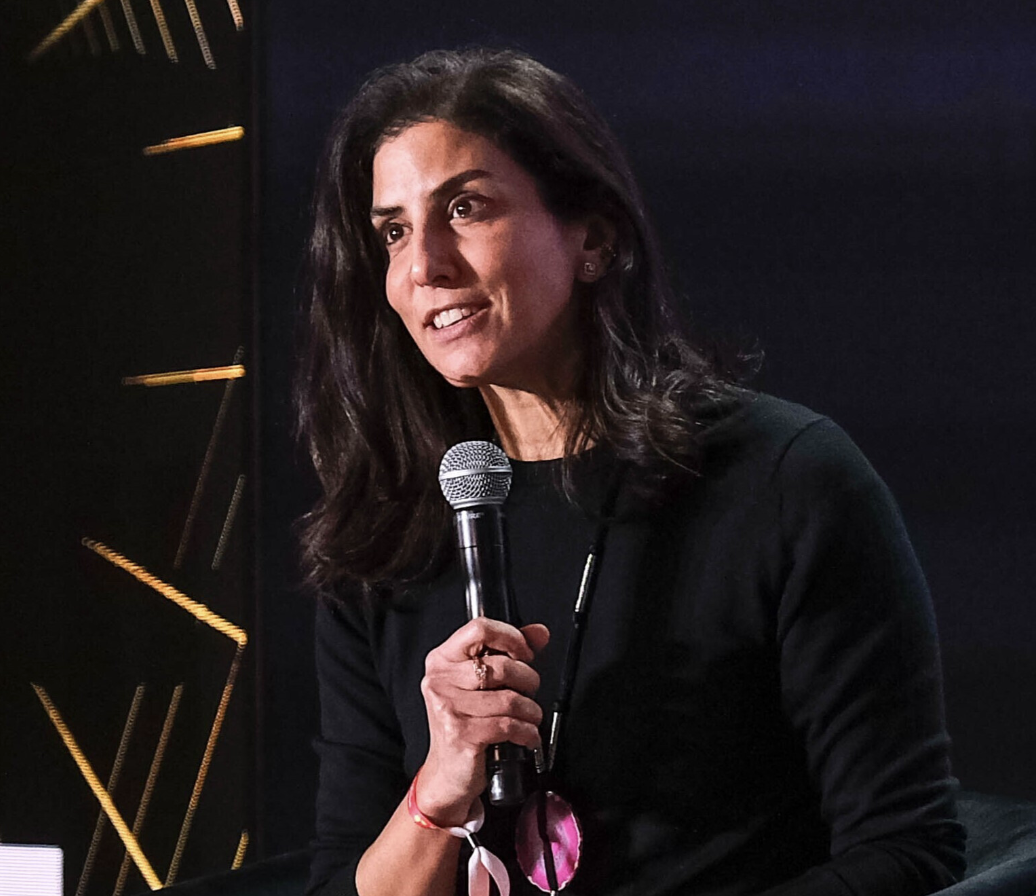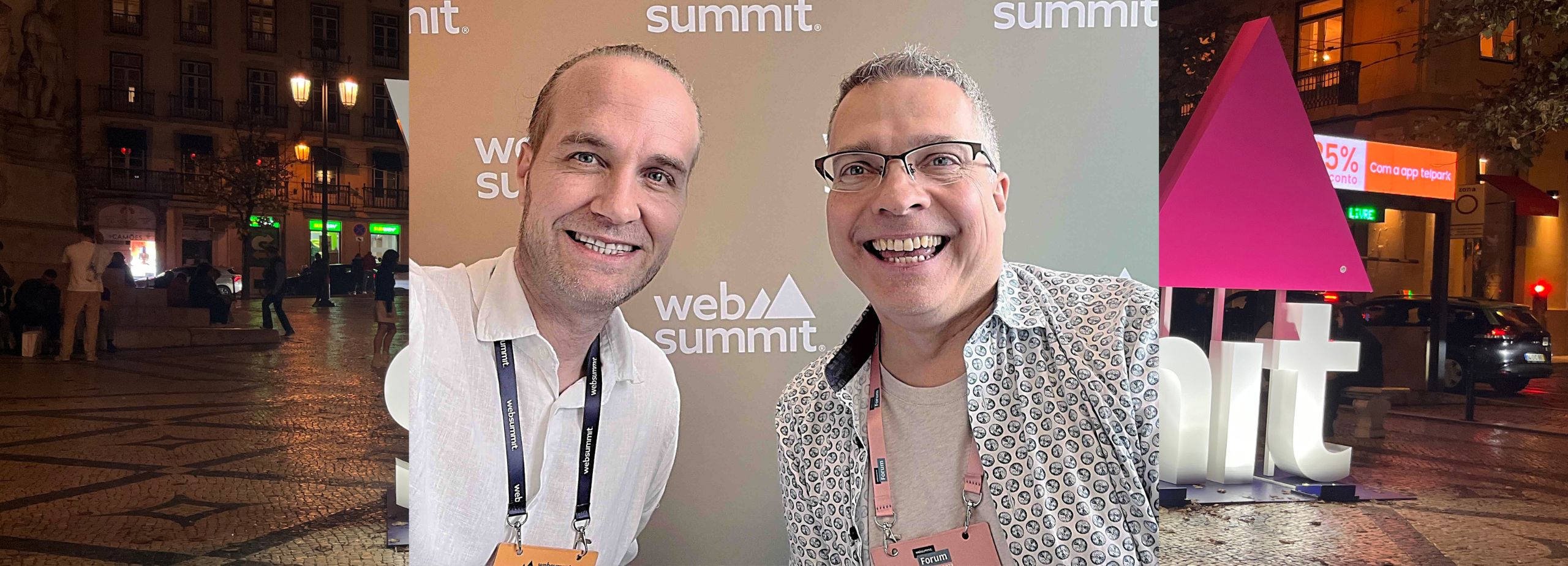Delphine Eddé is the Chief Marketing Officer at Arianee, a pioneering blockchain project focused on creating digital product passports for real-world assets.
With over 25 years of experience across various geographies and industries, she has led Arianee's marketing and communication strategies since 2021. Arianee has successfully raised $20 million in venture capital and collaborates with global brands including Richemont Group, L'Oreal, and Breitling.
In our conversation, we uncover the intersection of fashion, technology, and sustainability through the lens of digital product passports and blockchain technology.
___________________________________________________________
Ready to upgrade your Web3 marketing strategy? Don’t miss Consensus 2024 on May 29-31 in Austin, Texas. It is the largest and longest-running event on crypto, blockchain and Web3. Use code CMOSTORIES to get 15% off your pass at www.consensus2024.coindesk.com
Unlocking the Future: The Power of Adapting Content and Embracing Web3
Ever wondered how some brands manage to strike a chord with you, feeling almost like they were speaking directly to you? Or how about the buzz around blockchain and digital ownership that's reshaping industries?
In a world that's more connected than ever, understanding and adapting to your audience's unique cultural and local nuances is key to creating content that resonates. Meanwhile, the emerging Web3 space is revolutionizing how we think about digital ownership, privacy, and user engagement, especially in the luxury and fashion sectors. From the importance of local insights in content creation to the transformative potential of blockchain technology, we're diving into how these strategies are not just shaping businesses but also redefining user experiences and expectations.
These shifts are not just trends but necessities in today's globalized and digital-first world. They highlight the importance of being agile, culturally aware, and technologically savvy. Whether it's through creating content that feels personal and relevant or leveraging blockchain to offer unique digital experiences, the impact on engagement, loyalty, and growth is immense.
Curious about how all this works and why it's so important? Keep reading, as we'll be exploring these questions in detail, offering insights into the strategies that are setting businesses apart in the digital age.
Adapting to Your Audience
Understanding local insights plays a pivotal role in tailoring content that resonates with a specific audience. It's not just about translating content into the local language but about deeply comprehending the cultural nuances, preferences, and needs of the audience. This understanding forms the foundation upon which successful content strategies are built. It's about creating a connection that feels personal and relevant to the audience, making them feel seen and understood.
The process of adapting content to a local audience goes beyond surface-level adjustments. It involves a thorough analysis of local trends, humor, idioms, and even the socio-political climate. For instance, a marketing campaign that works wonders in one country might fall flat in another if it fails to align with the local culture's sensibilities. Therefore, the adaptation process is critical, requiring creativity, sensitivity, and a willingness to learn from the audience itself.
This approach has proven to be a key factor in business success. By presenting content that feels tailor-made for them, businesses can significantly enhance engagement, build trust, and foster loyalty among their audience. This strategy not only helps in capturing the attention of new customers but also in retaining existing ones. The effort put into adapting content underscores a brand's commitment to its audience, showcasing that it values and respects their unique context and preferences.
However, this process comes with its own set of challenges, especially when dealing with a balance between local and global audiences. On one hand, there's a need to maintain a universal brand voice and identity that's recognizable worldwide. On the other, there's a pressing need to localize content to connect on a deeper level with different demographics. This balancing act requires a nuanced understanding of what core brand elements must remain consistent and what aspects can be adapted to better suit local tastes. For businesses operating on a global scale, this often means creating multiple versions of content, each tailored to meet the specific needs and preferences of diverse audiences. The decision between focusing on a broader, global audience versus a more targeted, local approach depends on the brand's goals, resources, and the nature of its products or services.
In conclusion, adapting to your audience is not just a strategy but a necessity in today's globalized world. It demands a deep understanding of local cultures and an agile approach to content creation. While it presents its challenges, particularly in balancing global consistency with local relevance, the rewards in terms of engagement, loyalty, and business growth are immense. As brands continue to operate in increasingly diverse markets, the ability to adapt while maintaining a cohesive brand identity will be a critical determinant of success.
The Arianee Project
The vision and technology behind Arianee are both groundbreaking and visionary, aiming to revolutionize the way we think about ownership and data in the retail industry. At its core, Arianee seeks to empower both brands and consumers by providing a secure, transparent platform for managing digital identities of physical products. This initiative is built on the foundation of blockchain technology, which ensures the integrity, security, and immutability of data. Since its inception in 2018, Arianee has been steadfast in its mission, even as the technology and market conditions have evolved. The project has successfully raised $20 million in venture capital, demonstrating significant confidence in its vision and its potential to transform the retail sector.
The concept of digital product passports (DPP) is central to Arianee's innovation. These passports serve as a digital twin for physical products, providing detailed information about the product's origin, history, and current ownership. This concept goes beyond simple traceability; it opens up new avenues for consumer engagement, sustainability, and circular economy practices. Brands can offer personalized experiences, facilitate product reselling or recycling, and ensure authenticity, all through the digital product passport. This approach not only enhances the value proposition for consumers but also aligns with broader environmental and social goals by promoting longer product lifecycles and reducing waste.
The difference between off-chain and on-chain digital product passports is a critical aspect of Arianee's approach. While off-chain passports can provide basic information about a product, on-chain passports, which are stored on the blockchain, offer a much richer set of possibilities. On-chain passports enable interactive, dynamic experiences between brands and consumers, such as transferring ownership, proving authenticity, and accessing exclusive services or content. This distinction underscores Arianee's commitment to leveraging the full potential of blockchain technology, not just as a buzzword but as a tool for creating real, tangible value for users and brands alike.
The potential of blockchain technology in the retail industry is immense, and Arianee is at the forefront of exploring these opportunities. By creating a more virtuous Internet where data is owned and controlled by users, Arianee envisions a future where transactions are transparent, products are more sustainable, and consumer experiences are deeply personalized. The blockchain's principles of decentralization, security, and transparency are perfectly aligned with the needs of the modern retail industry, offering a pathway to rebuild trust and foster stronger relationships between brands and their customers. As the industry continues to evolve, the foundational work being done by Arianee today will undoubtedly play a pivotal role in shaping the future of retail.
Lessons from Founding Webedia Arabia
The decision to move to the Middle East and start a media company was driven by a unique opportunity to fill a significant gap in the market. Upon arrival, it became apparent that there was a dearth of content specifically tailored for women, covering topics such as luxury, fashion, beauty, entertainment, weddings, cooking, and parenting. This observation led to the creation of niche websites targeting these audiences, eventually growing into strong media brands within their respective verticals. This strategic move was not just about launching a business; it was about creating a platform that resonated with and served the needs of a specific demographic that had been largely overlooked.
The challenges of building a team and managing growth were among the most significant hurdles faced. In a region where the internet industry was still nascent, finding and training the right people was both a challenge and an opportunity. The team that was built became the backbone of the company, with some members even being recruited by global tech giants like Google and Meta. This experience underscored the importance of investing in people as the key to any successful venture. Additionally, managing the company's growth presented its own set of challenges, from securing sufficient capital to expanding geographically. These experiences taught valuable lessons about the complexities of scaling a business and the importance of strategic planning and execution.
The importance of adapting to the local audience was a critical factor in the success of Webdia Arabia. The realization that local audiences were being served international content that was either poorly translated or badly adapted led to a strategic pivot towards creating content that was not only locally relevant but also culturally resonant. This approach not only filled a content void but also built a loyal audience base that felt seen and understood. The ability to adapt and tailor content to meet the specific needs and preferences of the local audience was a key differentiator and a driving force behind the company's growth and success.
Reflections on the entrepreneurial experience and the lessons learned reveal a complex yet rewarding adventure. The entrepreneurial path is fraught with challenges, from the emotional rollercoaster of highs and lows to the practical hurdles of building and scaling a business. However, these experiences offer invaluable lessons that shape one's approach to business and life. The importance of building a strong team, the necessity of adapting to your audience, and the complexities of managing growth are just a few of the insights gained. These lessons not only reflect the realities of entrepreneurship but also highlight the resilience, creativity, and adaptability required to succeed in an ever-changing business environment.
Transitioning to a Fast-Moving Industry
Transitioning into the Web3 industry, known for its rapid pace and somewhat chaotic nature, has been an exhilarating experience. Drawing parallels to previous work in fast-moving and chaotic regions, managing through the ups and downs of such dynamic environments has been both challenging and rewarding. This background has proven invaluable in navigating the complexities of the Web3 space, where despite having a clear vision and stable technology, the industry's rapid evolution demands constant adaptation and resilience. The ability to manage the unknown and steer through turbulent times is a skill honed from past experiences, making the transition into Web3 not just feasible but also exciting.
One of the most transformative aspects of this transition has been witnessing the evolution of user interfaces and APIs. The goal has always been to create seamless, frictionless experiences for users, and the progress in this area over the last few years has been nothing short of remarkable. Initially, users had to download specific apps integrating Web3 wallets, which was a barrier to entry for many. Now, the digital product passport of a purchased item can be found directly in the client's account of the brand, showcasing a significant leap towards user convenience and accessibility. This evolution is a testament to the industry's commitment to making Web3 technologies more approachable and easy to use for the average consumer.
The impact of hardware evolution on user experience in virtual worlds and games, such as those experienced in Decentraland, has also been profound. A few years ago, without the right hardware, the lagging and less-than-ideal user experience made it difficult for many to enjoy these platforms. However, improvements in hardware technology have greatly enhanced the user experience, making it easier and more enjoyable to immerse oneself in diverse virtual worlds. This progression highlights the importance of technological advancements in making Web3 spaces more accessible and engaging for a broader audience.
Amidst these technological advancements, it's imperative to remember the core values of industries like fashion and luxury brands. For these sectors, the creative narrative and the creation of the product remain central. Innovation serves as an enabler, allowing these brands to tell their stories in new and engaging ways to both wider and younger audiences. While the evolution of technology in the Web3 space is fascinating, it's essential to keep in mind that for fashion and luxury brands, creativity and the narrative behind each product are paramount. Technology is a powerful tool, but it should enhance and not overshadow the essence of the brand and the creativity that defines it. This balance between leveraging technological advancements and maintaining the integrity of the creative narrative is what will continue to drive the success of brands in this fast-evolving industry.

Delphine Eddé, CMO of Arianee
Exciting Developments at Arianee
The goal to onboard the next billion users into the Web3 ecosystem is not just ambitious; it's a testament to the transformative potential of this technology. At Arianee, the vision extends beyond the current state of the industry, aiming to make Web3 accessible and beneficial for a vast new audience. This initiative is driven by the belief that through strategic partnerships with brands, more people can be introduced to the technology in a way that emphasizes its benefits over its complexity. The focus is on enhancing the user experience with products and brands, making the underlying technology seamless and almost invisible to the end-user. This approach could revolutionize how people interact with digital ownership, offering a more intuitive and integrated experience.
The benefits of digital ownership and sovereignty over personal data are central to the Web3 philosophy and are particularly emphasized at Arianee. The concept of digital ownership extends beyond merely owning a digital asset; it encompasses having control over one's digital identity and personal data. This shift towards digital sovereignty represents a significant move away from the traditional centralized models of data management, where users often have little control over their own information. By empowering users to own and control their data, Web3 technologies offer a more secure and user-centric online experience. This change is not only beneficial for users but also aligns with growing global demands for privacy and data protection.
The importance of user data privacy and decentralization in the Web3 space is a core principle that Arianee upholds diligently. Decentralization is not just a technological choice; it's a commitment to respecting and protecting user privacy. In a decentralized Web3 environment, users retain control over their personal data, choosing what to share and with whom. This model contrasts sharply with the centralized systems where companies have unrestricted access to user data, often leading to privacy concerns. Arianee's approach ensures that while they may analyze user behavior to improve services, personal data remains strictly in the user's control. This commitment to privacy and decentralization is a cornerstone of the trust between Arianee and its users.
The excitement of being part of the Web3 industry is palpable among those working at Arianee and within the broader community. The industry is at a pivotal moment, poised to onboard the next billion users, and being at the forefront of this wave is exhilarating. The potential for Web3 to redefine online interactions, digital ownership, and user privacy is immense. For Arianee, the opportunity to contribute to this transformation is not just a business endeavor; it's a chance to be part of a movement that could shape the future of the internet. The enthusiasm for what lies ahead is a driving force, fueling innovation and pushing the boundaries of what's possible in the Web3 space.
The Importance of Circularity in the Fashion and Luxury Industry
The increasing demand for transparency and sustainability within the fashion and luxury sectors is not just a trend; it's a fundamental shift in consumer expectations and industry standards. Today, consumers are more informed and concerned about the environmental impact of their purchases than ever before. They seek out brands that not only talk about sustainability but also demonstrate it through their actions and policies. This demand for transparency goes beyond the final product; consumers want to know about the materials used, the manufacturing process, and the brand's overall carbon footprint. In response, brands are increasingly prioritizing sustainable practices and transparent communication, making it a core aspect of their identity and value proposition.
The growth of the secondhand market and its impact on the industry is another significant trend reshaping the fashion and luxury sectors. The rise of platforms dedicated to the resale of pre-owned items reflects a growing consumer interest in sustainable and budget-friendly shopping options. This shift is not only driven by economic factors but also by a desire to reduce waste and extend the lifecycle of products. The secondhand market is expected to account for 8% of the total market by 2026, indicating a substantial shift in consumer behavior and market dynamics. Brands are now recognizing the potential of this market, not just for its environmental benefits but also as a lucrative revenue stream and an opportunity to engage with a broader audience.
The role of digital product passports (DPP) in enabling circularity is a game-changer for the industry. These digital passports serve as a record of a product's lifecycle, from production to end-of-life, including any repairs or ownership changes. By providing a transparent and accessible history of each item, DPPs facilitate the resale, repair, and recycling of products, thereby promoting circularity. For consumers, this means a more informed purchase decision and a deeper connection to the items they own. For brands, it offers a way to engage with the circular economy, enhancing sustainability efforts and customer loyalty. The implementation of DPPs represents a significant step towards a more sustainable and responsible fashion industry.
The potential for new revenue models through services around firsthand production is an exciting development for brands looking to align growth with sustainability. As the industry moves towards a more circular model, brands are exploring innovative ways to decouple revenue from the volume of new products produced. This includes offering services such as repairs, customization, and recycling, which not only extend the life of products but also create new touchpoints with consumers. These services encourage a shift in consumer behavior, from a focus on constant consumption to a more thoughtful and sustainable approach. For brands, this represents an opportunity to develop new revenue streams while contributing to a reduction in waste and environmental impact. The challenge and excitement lie in reimagining the traditional business model to embrace circularity as a core principle.
Connecting with Arianee
The various platforms to learn more about Arianee offer a wealth of information for those interested in staying abreast of the latest developments in the Web3 space, particularly in the context of digital product passports and the luxury fashion industry. Arianee's presence is robust across several digital platforms, ensuring that regardless of one's preferred mode of engagement, there's an accessible way to connect. The official Arianee website serves as a primary source of information, providing detailed insights into their projects, mission, and the technology behind their protocol. For those more technically inclined, Arianee.org delves deeper into the protocol specifics, catering to developers and tech enthusiasts looking for a more granular understanding of the workings behind Arianee's offerings.
The importance of staying updated with Arianee's activities can't be overstated for anyone keen on the evolving dynamics of digital ownership and the integration of blockchain technology in the luxury goods market. Social media platforms like LinkedIn offer a more professional glimpse into Arianee's endeavors, sharing articles, updates, and participating in industry discussions that highlight their role and vision in the broader tech and fashion landscapes. This blend of technical detail and industry insight provides a rounded perspective on Arianee's impact and future directions.
The active discussions on Discord about protocol updates and questions represent a vibrant community of tech enthusiasts, developers, and followers of Arianee's progress. Discord, in particular, stands out as a dynamic forum for real-time conversations, protocol updates, and community engagement. It's a space where individuals can pose questions, share insights, and discuss the nuances of Arianee's technology with peers and experts alike. This level of interaction and access to information fosters a collaborative environment, encouraging innovation and shared learning.
The availability of blog articles and show notes for podcast episodes further enriches the pool of resources available to those interested in Arianee's work. For listeners who prefer auditory learning or wish to engage with content during their commute, podcast episodes featuring discussions around digital product passports, sustainability in fashion, and the future of Web3 offer valuable insights. Accompanying these episodes, blog articles and show notes provide a written record of the discussions, including links and references mentioned, making it easier for the audience to follow up on specific points of interest. This multi-faceted approach to content ensures that information about Arianee and its pioneering work is accessible, engaging, and informative for a diverse audience.
Wrapping It Up
It's time to bring our exploration to a close. Throughout this extensive discussion, we've traversed the realms of audience adaptation, the innovative strides of Arianee in the Web3 space, and the pivotal role of circularity in the fashion and luxury industries. Here are the key takeaways:
Understanding and adapting content to local cultures and preferences is essential for engaging and retaining audiences, especially in a globalized market.
The Arianee project exemplifies the potential of blockchain technology in creating sustainable, transparent, and user-controlled digital identities for products, pushing the boundaries of digital ownership and privacy.
Circularity in the fashion and luxury sectors is gaining momentum, driven by consumer demand for sustainability and transparency, with digital product passports playing a critical role in this shift.
As we ponder the future of digital ownership and the integration of blockchain technology in various industries, one question remains: How will businesses balance the need for global consistency with the imperative of local relevance in their content strategies? Until we meet again, let's keep exploring these evolving dynamics.

Joeri Billast and Delphine Eddé on the Web3 CMO Stories podcast
KEY HIGHLIGHTS
[02:01] What inspired your journey into bridging the gap between fashion and technology, with a focus on sustainability and circularity, throughout your 25-year career across diverse geographies and industries?
[06:50] What is your role and vision at Arianee?
[08:41] What is a Digital Product Passport?
[12:38] Could you share more about your experience founding WebPedia Arabia and how it became a significant media presence in the Middle East?
[19:00] How are AI, the Metaverse, and NFTs impacting your work at Arianee, and do you foresee a specific evolution or direction for Arianee in the near future because of these technologies?
[22:56] What are you currently most excited about in your work at Arianee and beyond? Are there specific projects or developments that you're eagerly anticipating or working on?
[24:35] Where can people find more about Arianee and connect with you for further information or collaboration?
NOTABLE QUOTES
“I guess curiosity and leading and paving the way for users and brands, I guess this is really the driver for me.”
“I like, really, this rule for me is first you do and you discover and then you talk about it, or you tell the rest of the world what you did. And I've always gone by that. I'm really a doer.”
“I don't want to be in a box. I want to do a lot of things in my life I want to touch so many industries don't put me in a box.”
“The real challenge is how you manage the growth of this company.”
“I think for me, what is important, what was important is that my team, or the team I built was the key to everything.”
MENTIONED RESOURCES
Arianee Website: https://www.arianee.com/
Arianee LinkedIn: https://www.linkedin.com/company/arianee/
CONNECT
LinkedIn: https://www.linkedin.com/in/delphineedde/
Instagram: https://www.instagram.com/delphine_edde/






